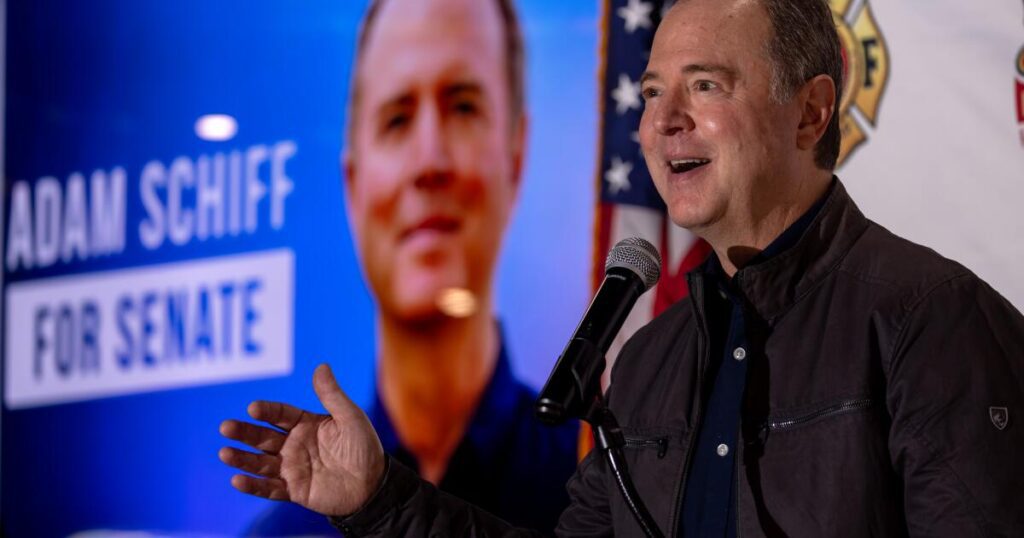For a long time, life in California had certain rhythms.
Winter snow in the Sierra. Spring blooms in the desert. Come election season, that's an inherent and often insurmountable advantage for Bay Area candidates seeking statewide office.
Drifts piled up from Tahoe to Tehachapis. The wettest months promise a stunning flower display throughout the Southland. But that Northern California advantage? She disappeared in the US Senate contest on March 5.
Rep. Adam P. Schiff, whose Southern California district is more than 300 miles away, easily took control of the Bay Area en route to a primary victory over fellow Democrats Katie Porter and the district's Barbara Lee. He is likely to win the Senate seat next November against the challenger who helped push him to a runoff in November, the sacrificial Republican Steve Garvey.
“It's a paradigm shift,” Gary South, a longtime Democratic strategist, said of Schiff's nine-county Bay Area sweep.
Geography—the place a candidate calls home—has been a key factor in political success in California. It's now largely an afterthought, and this change could muddy the campaign's calculus forever.
Some were convinced that Lee, who represented Oakland in Sacramento and Washington for more than three decades, would have the upper hand in the hotly contested Senate race. She was the only major Democratic candidate in Northern California facing Schiff and Porter, who are from Orange County.
But Lee couldn't do better than a third-place finish anywhere in the Bay Area, except in Alameda County — her political base — where she finished second but lost to Schiff by a wide margin.
This is because any regional advantage has seemingly been erased by the nationalization of politics, by the ubiquitous reach of social media, and especially by the star-making power of television news, which has turned figures like Schiff into political celebrities far beyond their home turf. .
(Schiff also got a big boost from Donald Trump's childish jeering and censure by the Republican-run House, which not only raised his profile but turned Schiff into a hero in the eyes of many Democrats.)
Historically, candidates from the Bay Area have had an advantage in statewide races because people there tend to be more politically active and more in tune with their elected officials. Residents also turned out in larger numbers than voters elsewhere in California, providing a boost to candidates they were more familiar with.
“It's rare to hear a conversation about politics standing in line at a Starbucks in Southern California,” said Ace Smith, who has run campaigns in the Bay Area and statewide for more than four decades. “But you hear those conversations in Northern California.”
This may be a generalization, but history bears out the essence of what Smith proposed. The Bay Area's significant and longstanding influence in state politics has boosted the careers of Kamala Harris, Gavin Newsom, and Dianne Feinstein, among others, all of whom have triumphed over challengers from the more populous southern half of California.
It's been especially difficult for House members running statewide. For more than a century, only a handful have made it to the Senate.
That's because most of them have spent their careers toiling in relative anonymity. Venture just a few blocks outside one of California's congressional districts — there are 52, spread more than 1,000 miles from north to south — and it's possible the visiting lawmaker could be a member of the witness protection program.
Raising money, building name recognition, and intimidating a large crowd were all tough challenges for any actor venturing far from home.
But things have changed dramatically in recent years. A viral moment or headline-grabbing shift on the Washington chat show circuit — where Schiff appears to have a semi-permanent residence — could now turn the most obscure member of Congress into a household name.
In fact, it could be argued that the path to statewide political success no longer runs through the foothills of San Francisco, the flats of Oakland, or the sprawl of Silicon Valley.
As Porter—of whiteboard fame—and Schiff have shown, reputations and careers can be built most fruitfully in television studios in Washington, on the House floor, or inside committee rooms as the Inquisition is broadcast from Capitol Hill.
Bob Shrum, a veteran Democratic strategist, once said that a political caucus in California consisted of three people huddled around a television. He was referring to the power of advertising, which is the only effective means of reaching voters in a nation-state with tens of millions of voters.
Minor updating may be needed, to account for technological changes. One might say a television set, or smartphones that voters hold in the palm of their hands.
But Shrum's general observation about the political power of the small screen rings truer than ever.
